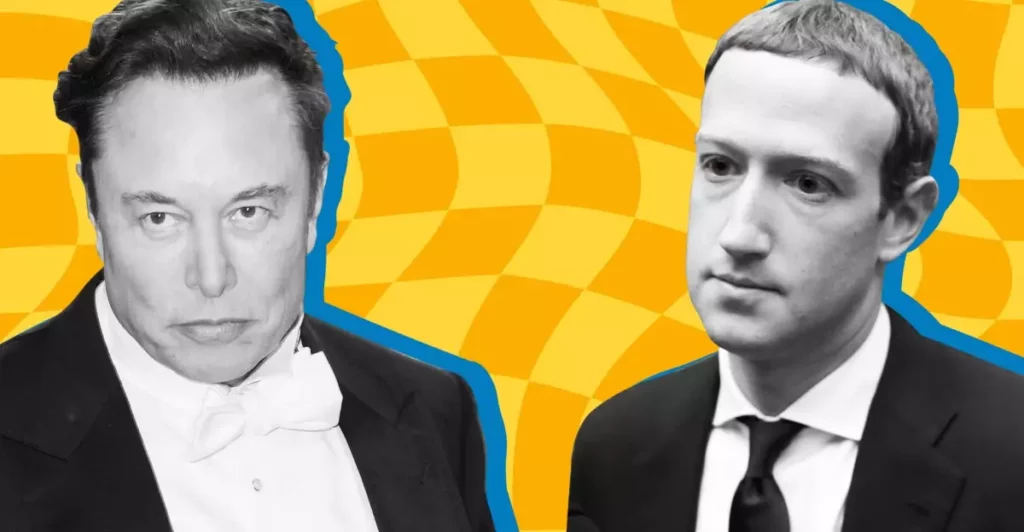In an age where the boundaries between reality and digital fiction blur, we are left contemplating the implications of artificial intelligence and our celebrity-obsessed culture. Last weekend, a peculiar spectacle unfolded in California as the synthesized voices of tech giants Elon Musk and Mark Zuckerberg became part of urban folklore—crosswalk signals voiced with humorous dialogues stirred public discourse. At intersections in cities like Palo Alto and Redwood City, passersby encountered Musk’s voice inviting companionship and Zuckerberg’s sardonic commentary on democracy, evoking laughter while simultaneously urging deeper reflection on the ramifications of technology.
What may initially appear to be a harmless prank morphs into a significant narrative about our relationship with technology, particularly as it intertwines with the personalities of those who command vast influence over our lives. Intriguingly, the comedic nature of the prank does not merely serve to entertain; it compels us to scrutinize the vulnerabilities of our technological infrastructure. In a time when hacking and digital manipulation are common threats, these seemingly innocuous signals underscore a pressing concern: if tech titans’ voices can be inelegantly synthesized and weaponized for humor, what else in our daily interactions with technology could fall prey to unscrupulous exploits?
The Heroes and Villains of the Digital Age
Elon Musk and Mark Zuckerberg are no strangers to controversy; their exploits often incite fervent debate. By appropriating their voices for comedic effect, the pranksters tapped into a cultural zeitgeist that oscillates between reverence and disdain towards these figures. Musk’s celebrated innovations and Zuckerberg’s dubious political entanglements reveal a dichotomy in public sentiment: they are both admired and resented, existential embodiments of our philosophical confusion regarding technological advancement and personal privacy.
The clever infiltration of public spaces with insidious humor calls attention to the broader dialogue about accountability in the age of digital monopolies. Are these figures accountable for the ramifications of their staging upon society? The lines become blurred; while Musk may be heralded as a pioneer in electric cars and space travel, his alienating persona invites critique. In parallel, Zuckerberg’s ventures have raised existential concerns surrounding democracy and civil liberties. By delivering these parasitic lines of satire through their voices, we gain insight into society’s fraught relationship with celebrity culture—where political incorrectness often elicits both laughter and outrage.
When Laughter Hides Serious Concerns
It’s not uncommon for satire to illuminate deeper, often uncomfortable truths. Through the veil of humor presented in this crosswalk prank, we are entreated to consider the volatile intersection of media, technology, and public perception. While feigning a mischievous air, what emerges is an uncomfortable reminder that the technology we embrace can undermine rather than elevate the fabric of democratic society.
The convenience and efficiency of technology, positioned as tools of individuality, are frequently juxtaposed against their capabilities for manipulation. The idea that the voices of such influential figures could be both amusing and damning allows the spectator’s mind to wander: Should we remain passive consumers of these automated narratives, or should we actively question the ethical dimensions and intentions behind them? In navigating the often murky waters of social media, we find ourselves as agents in a digital minefield, where the importance of questioning established norms and narratives is paramount.
The Dualities of Tech Celebrity
The delivered lines by Musk and Zuckerberg, though intended for humor, harbor an inherent duality that illustrates the complexities of modern celebrity culture. They are figures who evoke both admiration and disdain—a reflection of societal ambivalence towards rapid technological advancement. In today’s narrative, we recognize that we don’t merely consume technology; we also participate in its proliferation, susceptible to the very systems that we help create and maintain.
These interactions, exemplified in the etched voices echoing through the crosswalks, become conduits of cultural critique. While we may chuckle at Musk’s cringe-worthy invitations for friendship or at Zuckerberg’s provocative boasts, we must also reckon with the ramifications these figures have on our freedoms and democracy. Can we genuinely laugh when the punchline hints at a catastrophic misalignment of power and ethics?
As the public finds humor in the absurdity of these technological impersonations, it is crucial to unearth the vantage point of individual agency within a burgeoning AI landscape. The interplay between humor and critique encapsulates society’s struggle with the newfound power wielded by tech giants as they shape our thoughts, behaviors, and interactions. The laughter at the intersections may fade, but the questions of accountability and the ethics surrounding the use of technology will echo long after.









Leave a Reply